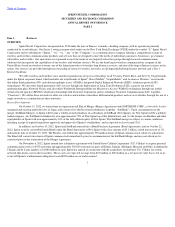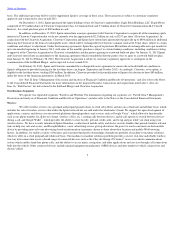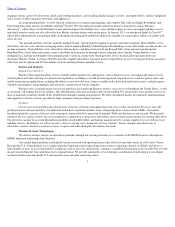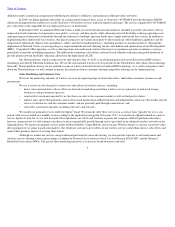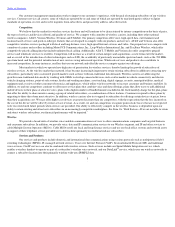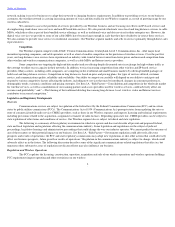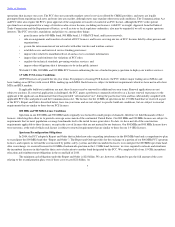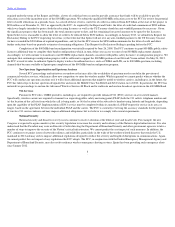Sprint - Nextel 2012 Annual Report Download - page 14
Download and view the complete annual report
Please find page 14 of the 2012 Sprint - Nextel annual report below. You can navigate through the pages in the report by either clicking on the pages listed below, or by using the keyword search tool below to find specific information within the annual report.
Table of Contents
In the November 2011 order, the FCC also adopted new rules requiring local exchange carriers (LECs) to lower their rates when they meet
certain traffic pumping “triggers.” Traffic pumping occurs predominantly in rural exchanges that have very high access charges. Under traffic pumping
arrangements, the LECs partner with other entities to offer “free” or almost free services (such as conference calling and chat lines) to end users; these
services (and payments to the LECs' partners) are financed through the assessment of high access charges on the end user's long distance or wireless
carrier. As a major wireless and wireline carrier, we have been assessed millions of dollars in access charges for “pumped” traffic. The FCC's new rules
have limited, to some extent, our exposure to these traffic pumping costs.
The FCC's special access rate proceeding remains open. In 2012, the FCC released an order freezing the existing special access pricing
flexibility
“triggers,” and another order requiring parties to submit information needed to assess the level of competition in the special access market.
The FCC also has initiated a further notice of proposed rulemaking to consider whether special access pricing flexibility rules need to be changed, and
whether the terms and conditions governing the provision of special access are just and reasonable. We continue to advocate for special access
reform but cannot predict when these proceedings will be completed or the outcome of these proceedings.
Universal Service Reform
Communications carriers contribute to and receive support from various USFs established by the FCC and many states. The federal USF
program funds services provided in high
-
cost areas, reduced
-
rate services to low
-
income consumers, and discounted communications and Internet
services for schools, libraries and rural health care facilities. The USF is funded from assessments on communications providers, including our
Wireless and Wireline segments, based on FCC
-
prescribed contribution factors applicable to our interstate and international end
-
user revenues from
telecommunications services and interconnected VoIP services. Similarly, many states have established their own USFs to which we contribute. The
FCC is considering changing its USF contribution methodology, and may replace the interstate telecommunications revenue
-
based assessment with
one based on either connections (telephone numbers or connections to the public network) or by expanding the revenue base to include data
revenues. The latter approach in particular could impact the amount of our assessments. The FCC issued a notice of proposed rulemaking on USF
reform in April 2012, but has not announced an estimated timeline for adoption of an order in this proceeding. In addition, the FCC issued a decision
redefining the manner in which carriers certify their compliance with USF obligations on facilities used in the provision of information services
beginning in 2014. The FCC's new service
-
by
-
service certification process may increase our cost of complying with the FCC's USF obligations and/or
our USF contribution obligations in some circumstances. This order has been challenged on appeal and various carriers have sought reconsideration
of the decision before the FCC. As permitted, we assess subscribers a fee to recover our USF contributions.
In
2012
, Sprint completed the mandated phase out of its high
-
cost USF support as an Eligible Telecommunications Carrier (ETC). Sprint did
not participate in the “Mobility Fund” or “Connect America Fund” broadband USF programs, but continues to evaluate possible future participation
in these programs.
Virgin Mobile is designated as a Lifeline
-
only ETC in 36 jurisdictions as of
December 31, 2012
, and provides service under our Assurance
Wireless brand. Lifeline ETC applications are pending or planned in other jurisdictions as well. Virgin Mobile's Federal Lifeline USF receipts increased
substantially in 2012, although changes in the Lifeline program by the FCC and other regulatory/legislative bodies could negatively impact growth in
the Assurance Wireless and wholesale subscriber base and/or the profitability of the Assurance Wireless and wholesale business overall. The FCC
recertification process, for example, is expected to have a substantial one
-
time reduction on subscribers in the first half of 2013.
Electronic Surveillance Obligations
The CALEA requires telecommunications carriers, including us, to modify equipment, facilities and services to allow for authorized
electronic surveillance based on either industry or FCC standards. Our CALEA obligations have been extended to data and VoIP networks, and we are
in compliance with these requirements. Certain laws and regulations require that we assist various government agencies with electronic surveillance of
communications and provide records concerning those communications. We do not disclose customer information to the government or assist
government agencies in electronic surveillance unless we have been provided a lawful request for such information.
11


